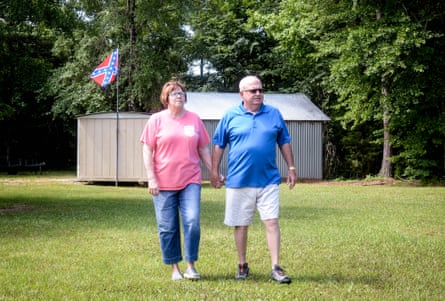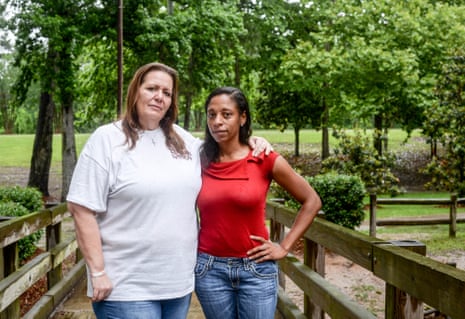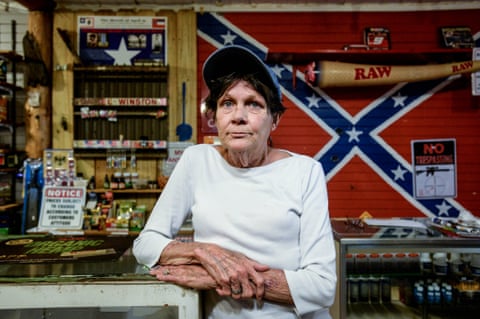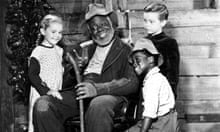It was 1957 when little Lindy Luby’s great-uncle showed up at her house near Benton, Mississippi, where the family had lived for generations. He was a justice of the peace in Yazoo City, the gateway to the fertile, brutal lands of the Delta.
“Effie, it’s just been a bad day,” the lawman said to his sister, as the six-year-old listened. “I just had to go cut a black boy down off that hanging tree and take him to his mama.”
The infamous tree, used for lynching, was bending over a bridge on Highway 433 toward Lexington.
“What did he do?” Effie Luby asked.
“He raped and killed a white woman.”
Lindy, now 66, has shifted her stance on the death penalty. After she sat on a jury that condemned a man to death, she now campaigns for alternatives to execution and stars in a new documentary about her experience.
The first cut of the film also showed Lindy and husband, Ira Isonhood, flying the Confederate battle flag on a 20ft pole in the backyard of one of their homes.
To many white people in the south and beyond, the Confederate flag is a sign of historic pride and defiance to whatever is currently called “liberalism”; to most black Americans, the flag stands for white supremacy and racial violence. Today, the symbol often appears at “pro-white” rallies and is a lightning rod in America’s calcifying racial divides.

The flag’s history is fraught and complicated, as was the bloody civil war that erupted in 1861 between the US south – where America’s slave trade had relocated and expanded by the mid-1800s – and the north. After the north won, it imposed a harsh Reconstruction on the south that still fuels white resentment today.
The post-war white south embraced the Confederate battle flag, making it their sentimental symbol of the “lost cause” of the war. By the time Mississippi embedded it into its new state flag in 1894, the flag was used to both honor the Confederate dead as well as a romanticized version of the war’s purpose.
By the mid-20th century, the flag symbolized white resistance to ending segregation laws. The Ku Klux Klan flew it at lynching parties and angry mobs waved it outside public schools as black children enrolled; in front of white “segregation academies” and next to leering dogs unleashed on black protesters wanting the right to vote. (Today, its supporters say the KKK co-opted it.)
In April 2001, Mississippians voted along race lines to keep the flag as it was. The debate reignited in 2015 after Dylann Roof killed nine black people in a church in Charleston, South Carolina. A photo soon emerged of him holding a Confederate flag.
The matter is especially raw in Mississippi, a state that suffered tremendous Confederate casualties and went from being the richest state from slavery before the civil war to one of the poorest.
The Isonhoods were the first stop of my May 2018 listening tour of Mississippi with photographer Kate Medley to ask flag supporters in our home state why they still support a symbol that represents so much pain, division and difficult history – even as they urge black Americans to get over their resistance to it.
Yazoo County, west-central Mississippi
Ira Isonhood, 71, remembers his father inviting black people to sit in his yard to watch a basketball game through the window when he got the area’s first television – a progressive move in the mid-20th century south. But he was still a product of his time.
“Yes, he was. [My father] was prejudiced,” Ira says.
One day, a black boy came to his dad’s store with a shopping list his mother had signed with “Mrs”. His father sent a note back with no groceries. When her husband came later, the storekeeper admonished him in front of young Ira. “Don’t ever allow your wife to sign ‘Mrs’ again!” he warned.
Still, Ira flies the flag, which his own high school and college used as an emblem.
“The Confederate flag played a big, big part in our history,” Ira says. “… Why are these minorities pushing to do away with this flag? Look at what’s happening to our statues!” he says.

Neither Ira nor Lindy has asked black acquaintances why the flag is offensive, or asked why many believe it belongs in museums, but not part of a state emblem. “I don’t think the black people around here care,” Lindy says.
She wonders why the flag is once again becoming a big deal. “Is it their feelings? … Mississippi has bent over backwards to say I’m sorry. How much more do we need to do?”
I later relay Lindy’s questions to Genesis Be, a 31-year-old hip-hop artist, public speaker and anti-Confederate flag activist from Biloxi. I met Be after reporting that her grandfather, Pastor Clyde Briggs, was a target of the Klan in the 1960s for trying to organize and arm black people against white supremacy. I have stuck my finger into a bullet hole in her family home where the Klan fired into the wall above where her aunt, then a child, slept.
“What has Mississippi done to say that it is sorry for the rape, torturing and killings of scores of its black citizens in order to create a white majority?” Be says. “Open a museum?”
“I’ve never heard of an apology from the Klan in Franklin County for harassing and assaulting my family while flying that flag. All I’ve heard is a downplaying and whitewashing of history in an attempt to gaslight its population.”
Ongoing inequities, Be reminds, are bolstered by a kinder, gentler version of Confederate history rewritten after the south lost the civil war and its rights to maintain and extend slavery.
Greenwood, north-west Mississippi
After driving north along the lonely stretch of Highway 49 through Delta plantation lands, we end up in Larry McCluney Jr’s attic in Greenwood.
The room is a shrine to the Confederacy with a rebel-flag-themed cushion, curtains and even a mousepad. There’s also a civil war chess set. The closet is packed with battle re-enactment costumes and weapon replicas.

McCluney, 53, is a national officer in the Sons of Confederate Veterans, which accepts male descendants of southern soldiers. SCV was created in 1896 for the “vindication of the cause for which we fought” and to ensure “that a true history of the 1861-1865 period is preserved.” SCV members worked with the United Confederate Veterans and other groups in the early 20th century to demand school textbooks supporting the revisionist view that the south fought for a just “lost cause” that was decidedly not slavery.
McCluney has taught history and government for 25 years to mostly black Delta students.
“People like me … it’s in our blood. We know about our family, their sacrifices,” he says of his 20 ancestors who fought for the Confederacy.
“Slavery was an issue, but not the cause,” the teacher tells me. He repeats SCV’s selective semantics with precision: the south seceded over “states’ rights” to financial independence; the north and Abraham Lincoln weren’t against slavery at the outset; northern tariffs were killing the south; few southerners and soldiers owned humans; slavery was fading anyway; and it wasn’t about white supremacy.
The facts are more complicated.
Despite decades of efforts to renovate history, Mississippi’s Declaration of Secession still begins by clarifying that the state left the union in 1861 for a cause “thoroughly identified with the institution of slavery,” adding for posterity that “none but the black race can bear exposure to the tropical sun” that enables cotton to flourish.
By 1861, the south was demanding slavery expansion into western territories, which Lincoln’s “Black Republicans” adamantly opposed. The SCV is correct, though, that Lincoln did not initially call for emancipation. In fact, Frederick Douglass called Lincoln “preeminently the white man’s president, entirely devoted to the welfare of white men.”
The south was demanding a federal slavery code to force all states to comply with the Fugitive Slave Act of 1850 and return runaways to owners, even as northern states were passing “personal liberty laws” to circumvent what abolitionists called the “bloodhound law”.

In his attic, McCluney downplays slavery ownership – saying “elite” planters, not soldiers, owned most slaves. “Most (southerners) did not have a dog in the hunt,” he says.
He is right, but only to a point. Most of the soldiers were young – a fifth were under 18 – and few owned any of the 4 million slaves in the US. But many of their households owned at least one, or they aspired to ascend to slave ownership. The 1860 census shows 49% of families in Mississippi – one in two – owned at least one slave. Mississippi had 436,631, the most in the nation and 55% of the state’s population.
But slavery was waning, McCluney insists, and the north should have let it fade naturally. After I mention that Mississippi outlawed freeing slaves in 1857, he said that the south wouldn’t have seceded if the federal government had allowed (white, male) voters to decide slavery per state or territory.
McCluney teaches his black students his Confederate history. “I try to be sensitive. I’m a pointblank person. Don’t ask if you don’t want to know.” But, he adds, “they know me as a teacher who cares about them”.
The educator points to Roof’s “horrible, horrible” 2015 massacre of black worshippers – and his viral photo holding the Confederate flag – as inciting a war on the emblem.
“Politically correct groups seized that opportunity to make it seem like that flag came down that pole, walked down into that church and killed those people,” he says. “… That was horrific to my organization (SCV) when that took place.”
I later share those words with Derrick Johnson, the national president and CEO of the National Association for the Advancement of Colored People (NAACP), who previously led the Mississippi chapter.
“Wow,” he says, then pauses.
“Just a point of history … Prior to Roof’s massacre, the South Carolina NAACP had waged a 15-year boycott against the state for its [Confederate] flag display,” Johnson says. “And I was one of several plaintiffs in a lawsuit against Mississippi in 1993 to have the flag taken down.” The SCV intervened in that lawsuit and won.
Then Johnson turns to Roof: “All of the views and racial hatred symbols that informed his opinion walked into that church with him. He’s more than enough reason that the symbols of the Confederacy should be removed from the public square.”
Pearl, Rankin County, central Mississippi

Thomasa Massey, 49, jumps out of her car at Pearl Park in a majority-white Jackson suburb wearing a T-shirt with Confederate butterflies she designed with “Pride, Not Prejudice” underneath.
When I had interviewed her about being in a white gang, I saw her defending the flag on Facebook. Her friend Evangela Hentz, who is black, opens the passenger door, and we all run through the rain to a pavilion. The two single mothers finish each other’s sentences, laughing about that time Hentz went into labor where they worked and Massey put her in an office chair to wheel her downstairs to go to the hospital.
“I have struggled. She’s helped me. She’s struggled. I’ve been there for her,” Massey, the child’s godmother, says.
Massey, who identifies as more “Blackfoot-Cherokee” than white, isn’t interested in military history, saying the flag celebrates her heritage as a southerner, period. She grew up in Red Bay, Alabama, in a former slave region that the last census showed as 93% white and 1% black.
“We just didn’t believe in racism. Nobody, my whole town,” she says.
The Confederate flag represents pride in the face of poverty to Massey, who came to Mississippi in 2001, the same year voters decided against changing the state flag. She supports Mississippians’ right to keep it as is.
“It was there when our grandfathers, great-grandfathers, were struggling to feed their six, eight, 10 kids. It flew for all colors, black, white, whatever,” she says.
Hentz, 41, is from Missouri, once a violent slave state, but calls the flag just an “inanimate object,” adding: “Stop letting it control you.”
“If you don’t breathe life into something, it will die,” Massey adds.
The friends reject being offended over what Hentz calls “just a piece of cloth”.
Be, who discusses the flag respectfully with friends who like it, challenges Massey, Hentz and others to probe deeper.
“It was poor white southerners who fought in these battles, being strung along by rich, property-owning whites who banked on the ignorance and arrogance of the poor whites to fight and die in the war,” Be says.
“They gave their life, but for what?”
Simpson County, south-central Mississippi
Gentlemanly Kevin Davis is surprised when we show up at his large white antebellum-style house in Simpson County. We are stopping by homes with flags, but owners keep pointing us on down the road to him.

Davis – no relation to Jeff – has taught history in public and private schools, and also turned out to be an SCV member. Thirteen of his ancestors fought for the south, but most didn’t own slaves. Three died in battle, and one in a makeshift hospital in the Lyceum at Ole Miss in Oxford, Mississippi – one of numerous buildings built by slaves.
“To me, the flag is not a racist thing. It’s a piece of our heritage that should be left there to honor sacrifices,” Davis says in a cozy parlor, adding that most soldiers were “dirt-poor farmers” with no slaves.
Davis, 47, also believes the institution might have died out due to “modernization … if they were able to compromise another 20 years. That’s what state’s rights were about: protecting slavery,” he says. “… There would not have been a war over tariffs.”
Most Confederacy fans may cherry-pick their side’s history, but many are more precise about the chinks in the Yankees’ armor – including that not everyone up north was hip to slavery ending, either.
Even as the institution had shrunk outside the south for a century, its riches continued to drive the US economy, including Wall Street and early capitalism, up to the 1860s. As the practice waned up north, white men rushed to the south, bringing slaves. By the civil war, cotton investment had made New York City the country’s financial center due to receiving up to 40% of all cotton revenues, representing $200m in annual trade with the south.
And, as McCluney points out, New York-financed slave ships kept sailing to West Africa for people to be sold in the Caribbean and South America.
Davis is circumspect on the complicated history: “I can say it was wrong, and I hope I wouldn’t have participated in (slavery), but how can we know for sure?”
Still, Davis balks at the need to exorcise the emblem from the state flag today out of respect to Mississippians who descended from slaves. His own ancestors’ sacrifice is paramount. “It’s so we don’t forget,” he says.
The history teacher could handle it if the state flag changed, though. “I would be sad about it, not violently upset. I would not be up around the last flag making a chain gang to keep somebody from taking it down,” Davis says.
Seminary, Covington County, south-east Mississippi
We’re on Highway 49 south when it pops up: Flag Heads, which sells “adult novelties” and Confederate tchotchkes.
“You won’t find it at Wal*Mart,” a large sign proclaims, reminding shoppers that the retailer dropped Confederate merchandise within a week of Roof’s massacre.
If you can put a rebel flag on it, they do: beach towels, BBQ aprons, windshield dice, coasters, flip-flops, polar fleeces, bikinis, umbrellas and more. Pipes fill a glass case, and we avoid the curtained adult room.

Petite Roslyn Stuart is behind the counter with a swagger like she has seen it all more than once. She immediately brings up Roof.
“Until that kid went in that church in Charleston, people never thought anything about the Confederate or Mississippi flag,” she says. “… The flag not gon’ change the hate.”
Stuart blames detractors. “It’s not us that’s racial; it’s them that’s racial. Most of ’em don’t know what it means,” she says. “It’s a symbol of our state; it’s who we are.”
She continues: “Northern people were down here trying to burn all our stuff” – true; the Yankees torched Jackson three times – “and we were trying to stop them … They didn’t think it was right we had slaves. It turned into one big heckuva mess. It’s lingering still out there.”
She worries that young people now think the flag stands for the KKK. “Eventually, they will take the state flag; they will change it. What’s next? The Christian flag?” she asks.
A black FedEx man wouldn’t come through the front door, she says, instead leaving heavy packages on the porch because “he thinks we’re racial”. So she asked for a new driver and got one.
Seminary, Mississippi
“Come on over!” Joe Barnes booms, describing his nearby Seminary home as the one with the US, Confederate and Mississippi flags out front, after I tell him Roslyn sent us.
Barnes, 66, beams as he hands us his SCV card with Nathan Bedford Forrest, the wealthy Memphis slave trader and first KKK grand wizard, pictured on the front.
Retired military, Barnes used to attend all the Ole Miss college football games, but he now watches on TV. He wrote the chancellor that he would never buy another ticket after the game ban of the rebel flag.

“Our ancestors fought under that flag,” Barnes says. “It’s not about hatred.” He adds that blacks fought for the south, too. (True, but usually for their masters. Many defected to segregated union camps.)
“Schools are not teaching history the right way,” he says. “… It’s not whites that are the racists; it’s mostly the blacks … What it boils down to is black people are just trying to overrule us.”
“If we can’t get white people to stand together, it’s going to be another civil war,” he adds.
Barnes has black friends, he says, and points out that African Americans use the N-word. “White folks can be that, too. There are trashy white people and trashy black people.”
SCV is not racist or violent, he says. “The Klan is different from us. The SCV might fly the flag, but we don’t associate with them. We’re not a violent organization. We try to help people.”
Johnson, CEO of the NAACP, says he wishes poor whites would recognize how powerful politicians have long played racial politics with Confederate emblems – a deliberate strategy to divide them from people with shared economic interests.
“The very same people that exploit the working class for cheap labor and create systems to undermine their development through poor education systems use issues of racial division to maintain economic control,” the NAACP president says.
The flag could easily be honored or studied in museums, he adds.
“The NAACP respects the constitutional, first amendment right for private citizens to maintain symbols and monuments on private property,” he says. “Enjoy.”
Johnson would not censor individual ownership or display of Confederate regalia – but also not continue official approval to historic symbols of racial violence and oppression. “Everyone should have the right to purchase and display symbols for themselves on private property, but [not force the flag to] represent all citizens of any particular community,” Johnson says, because they don’t.
Copiah County, south-west Mississippi

“Can you tell me why?”
On the last day, I again sit with Lindy Isonhood, this time at Deer Hollow, their other home farther south where Ira’s Confederate man cave, as Kate is calling the rooms we’ve seen, is packed with deer antlers, a boar’s head trophy, and little rebel flags. Ira is in the backyard posing for pictures in front of his Confederate flag.
Lindy has thought about our first conversation overnight and wants to understand why I do not support the flag.
“The war really was about slavery, and they didn’t hide it then,” I say as she listens intently. “But I don’t believe everyone who likes the flag is racist. Many people were taught certain things.”
I add that the division most hurts poor whites and people of color.
Lindy nods, describing her childhood of poverty when the family’s land was all they had left. Her sister would exchange clothes with a black friend, she says. “My family, we were poor. When I graduated from high school, we didn’t have an indoor toilet.”
“I am going to start researching this,” she adds about the history as Kate calls for her. Knowing that Lindy now talks to other Mississippians after rethinking the death penalty, I feel a twinge of hope as I watch Ira’s rebel flag flying outside the window of Deer Hollow.





